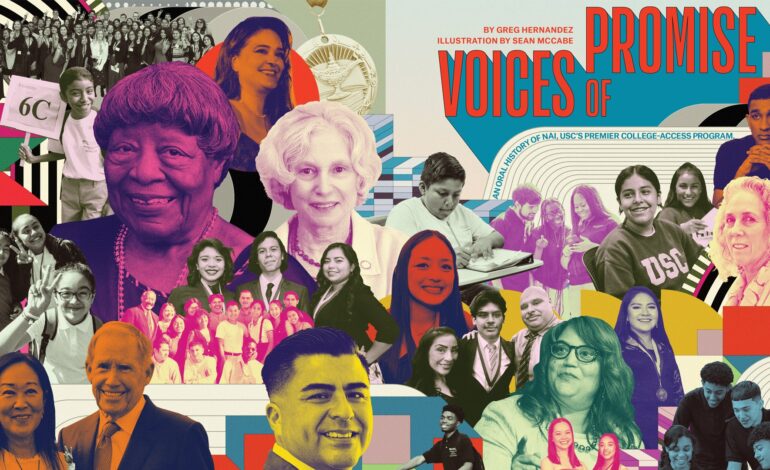USC’s Neighborhood Academic Initiative Celebrates 35 Years of Success

The Neighborhood Academic Initiative (NAI) at the University of Southern California (USC) marks its 35th anniversary this year, celebrating a legacy of empowering local students through a rigorous college preparatory program. Designed to support young scholars from neighborhoods surrounding USC’s University Park and Health Sciences campuses, NAI has guided nearly 1,700 students on their academic journeys since its inception.
NAI was established in 1988 by USC’s then-Vice Provost of Educational Affairs, Barbara Solomon, and former Undergraduate Vice Provost Sylvia Manning. The program began with a focus on high school students but quickly expanded to include middle schoolers, recognizing the importance of early intervention in educational success. Solomon noted, “We wanted students to develop the skills to succeed,” emphasizing the program’s commitment to fostering academic excellence from a young age.
The initiative requires participants to engage in a demanding seven-year program starting in sixth grade. Students attend early morning classes at USC and participate in Saturday sessions that provide academic enrichment, SAT preparation, and personal development. The program also includes workshops aimed at parents and caregivers, covering essential topics such as nutrition and financial literacy, to create a supportive environment for academic achievement. This comprehensive approach has resulted in remarkable outcomes: NAI boasts a 100% high school graduation rate and a 99% college graduation rate.
One of the program’s graduates, Luis Campo, who was part of the second NAI cohort, reflected on the early days of NAI, saying, “We didn’t know what the heck NAI was about at first because there was no marketing behind it.” Today, the program is well-known, with many aspiring students eager to apply.
Community and Family Involvement
Family participation is crucial to NAI’s effectiveness. Parents and caregivers are required to attend Saturday sessions, ensuring they are actively involved in their children’s education. This commitment fosters a culture of academic excellence within families. Kim Thomas-Barrios, USC’s senior vice president of educational partnerships, stated, “Parents want the best for their child, so they are willing participants.”
Students like Alexis Jacquez, a 2025 Woodrow Wilson Senior High School graduate, highlight the sacrifices made for education. Jacquez noted, “There are sacrifices like having to miss family gatherings on Saturdays… I would say, ‘This is good for me! I’m going to be going to USC.’”
The program recently received a significant boost from Leslie and William McMorrow, who made the largest donation to USC’s community outreach programs in 2018. This support has allowed NAI to expand its outreach, welcoming students from additional high schools in South and West Los Angeles, including Crenshaw High School and Susan Miller Dorsey High School.
Adapting Through Challenges
The COVID-19 pandemic posed unprecedented challenges for NAI, forcing the program to shift to online learning in March 2020. Many students faced severe hardships during this period, including the loss of family members who were primary breadwinners. Despite these difficulties, NAI staff adapted swiftly, providing essential services such as mobile hotspots, food assistance, and mental health resources.
Jacquez described the difficulties of attending NAI during the pandemic but remained focused on her educational goals. “I kept my focus on the main goal which was to succeed and get to college,” she said. By her sophomore year, the program transitioned back to in-person interactions, allowing students to form lasting connections with their peers and mentors.
The ongoing success of NAI demonstrates its vital role in the community and its ability to adapt to changing circumstances. As the program continues to grow, it remains dedicated to nurturing the potential of local youth, instilling in them the skills and confidence needed for university success.
With its ambitious mission and proven results, NAI stands as a testament to the transformative power of education and community engagement. As Solomon noted at a recent gala celebrating NAI graduates, “The presence of so many hardworking staff, administrators, and civic leaders reflected the high value placed on what the program has become.”
The legacy of the Neighborhood Academic Initiative continues to thrive, shaping the future of countless students and reaffirming the importance of educational access and equity.






